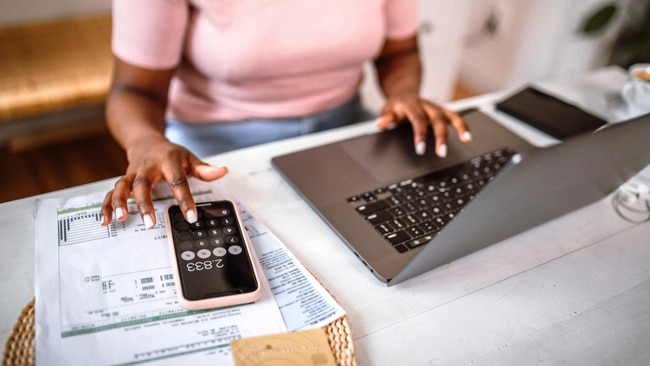How to manage money anxiety and financial stress, according to an expert
Don't let debt send you into a spiral

Anxiety & Depression
Don't miss out on the headlines from Anxiety & Depression. Followed categories will be added to My News.
With the cost of living crisis not abating anytime soon, financial stress is on the rise. Luckily there are actionable steps to help you manage your money woes.
As grocery and electricity bills rise and rents and mortgage repayments skyrocket, most of us are feeling some kind of financial pressure right now. The difference between financial pressure and financial stress, though, is the impact the changing cost of living is having on your mental health.
According to Kristin Naragon-Gainey, an Associate Professor of Psychological Science at the University of Western Australia, financial stress is generally either objective or subjective.
"There are a number of different terms people might use, but the most important thing is to separate it into two parts: one is an objective situation where you don’t have enough funds or assets or income to cover your necessary expenses and debts, and the second is subjective, so how you are feeling about your financial situation. The harder the financial situation you’re in the more likely you are to have worry, but the two are separable and there are people in pretty difficult financial situations who aren’t so worried and people who are meeting their expenses but are quite distressed," Naragon-Gainey explains.
Like what you see? Sign up to our bodyandsoul.com.au newsletter for more stories like this.
Why are so many people experiencing financial anxiety right now?
In a nutshell, things feel very economically uncertain right now and uncertainty tends to be a fertile breeding ground for anxiety or anxious feelings.
Over the past year, inflation has caused cost-of-living basics like food, transport and utilities to soar, while wages have by and large remained stagnant and failed to keep up with how much things cost. There’s also a shortage of rental properties available, meaning prices are skyrocketing for those who don’t own their own homes, and those that do are facing major increases in their mortgage repayments after yet another interest rate rise by the Reserve Bank of Australia. All of this comes after almost three years of living in a cocooned COVID-19 limbo that restricted our freedom to travel, spend time with family and had its own set of uncertainties.
When you combine all of those things, it’s actually pretty understandable and, dare I say it, reasonable, that so many of us are feeling anxious about where we’re living, how we’re living and what the future is going to look like. That doesn’t mean you have to fall into an hours-long emotional doom scroll, though. In fact, far from it.
"In general, humans are wired to want predictability and certainty about the future and it’s quite hard when that shifts and there is a lot of uncertainty introduced. I think it’s natural to be uncomfortable with that and want a little more guarantee that things are going to be okay going forward," Naragon-Gainey explains.
How can you manage financial anxiety?
Just like falling down a rabbit hole of vaguely related on TikTok at 11pm, imagining the worst-case scenarios can be an easy anxiety trap to fall into, and one that can feel hard to get out of. The good news is that taking small steps can shrink the size of your anxiety quickly.
Naragon-Gainey says, to begin with, start with a few small but simple steps.
"Creating a more thorough budget, checking in with financial consultants, and looking into switching utilities are all little things that can make a difference over time and the act of doing something can in itself be helpful for your wellbeing. A few other things are recognising that it is a difficult situation and trying to be not to be too hard on ourselves, and keeping in mind that who we are as a person, even though it can feel like it sometimes, really isn't defined by our financial state."
During this time, Naragon-Gainey also says you should also be looking for things that you do really well, explaining that focusing on the negative can make the situation worse, whereas recognising positive behaviours is just as important as finding areas for improvement.

How can financial anxiety impact your health?
Like any stress, if left unmanaged or unaddressed, financial anxiety can have serious side effects on your mental and physical health. This can include short-term impacts like disrupting your sleep, feeling drained or on edge, and longer-term issues like depression.
It's because of these risks that Naragon-Gainey says taking a number of steps to manage your anxiety is important and beneficial.
"Having a variety of ways of coping means that at any given time, you're more likely to have something that might help rather than just one thing that may work in some situations but not others," she says.
When should you get help?
The most important thing to remember is that there’s no shame in asking for help when you’re feeling anxious, and there’s no such thing as not being anxious enough to speak to someone.
While speaking to friends or family might feel tough, it can be helpful to let those around you know what you’re experiencing. If you feel you need more support, LifeLine and Beyond Blue also offer support, and can provide additional recommendations about managing your anxiety over the longer term.
"Many of us are feeling financial anxiety occasionally, but the signs that it's at that point to get some help is if you're feeling quite down or anxious or hopeless pretty persistently. So not just a bad day or here and there but most days for a couple of weeks or when the stress is impacting your life socially or at work, that’s a pretty good sign that it’s important to reach out for some help," Naragon-Gainey says.
If you or someone you know needs help, phone Lifeline on 13 11 14 or the 24- hour Suicide Call Back Service 1300 659 467.
Mental health professionals are available 24/7 at the beyondblue Support Service – 1300 22 46 36 or via beyondblue.org.au/get-support for online chat (3pm-12am AEST) or email response.
Originally published as How to manage money anxiety and financial stress, according to an expert


